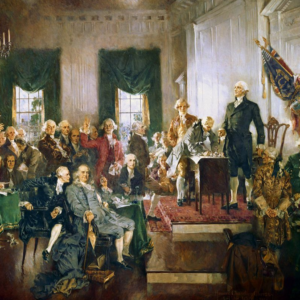As the political mudslinging crescendoed toward November 8, it was striking how many claims and lines of argument were justified on the basis of “preserving our democracy.” For example, voter ID laws were bad because they undermined democracy. Citizens had to vote to preserve democracy. The loser needed to meekly accept the official results, however questionable, to preserve democracy.
Such assertions treat democracy as an end in itself. However, democracy only serves all Americans, rather than some at others’ expense, to the extent it defends our common liberty.
The problem is that majority determination can undermine liberty, rather than defend it. America’s founders said so repeatedly, echoed by many others since. Even enemies to liberty have made that point. And the contractions of liberty that “progressive” expansions of democracy have imposed reinforce that lesson.
Rejecting democracy as a universal panacea, Thomas Jefferson asserted that “democracy is nothing more than mob rule, where fifty-one percent of the people may take away the rights of the other forty-nine,” but that “elective despotism was not the government we fought for.” James Madison noted that democracy provides “nothing to check the inducement to sacrifice the weaker party.” In sharp contrast, John Adams said Americans’ natural rights “cannot be repealed or restrained by human laws.”
The Declaration of Independence does not mention democracy. Neither does the Constitution. In fact, a constitution of limited, enumerated powers, with a Bill of Rights focusing on what the federal government is not allowed to do, is clearly inconsistent with unlimited democracy. If whatever some majority decided always determined the law, there would be no purpose in putting certain rights against government imposition beyond “democratic” determination.
The attitude toward democracy that informed America’s founding was highlighted by Alexis de Tocqueville, who noted that “the Federal Constitution … disavowed beforehand the habitual use of compulsion in enforcing the decisions of the majority.” James Fenimore Cooper, America’s first “national novelist,” similarly understood that “it must be an equivocal freedom, under which everyone is not the master of his own innocent acts.”
The conflict between democracy and liberty was expressed even more strongly by F.A. Harper, who asserted that “to be forced to bow to the dictates of others, against your wisdom and conscience,” is “the direct opposite of liberty.” Further, “Decision by the test of dominant preference is … might makes right. If might makes right, one must conclude that liberty is all wrong.”
Liberty’s opponents have also expressed the error of conflating democracy with liberty. For example, Marx asserted “democracy is the road to socialism.” Lenin said “democracy is indispensable to socialism.” When democracy is defended as advancing socialism, it does not protect liberty.
In democracy, every preference out of line with majority wishes is overridden. The general welfare is transformed into any dominant faction’s impositions. That enables “democratic” expropriation of rights and property from those who would keep them under liberty, revealed by the fact that no minority (democratic loser) ever pushed for majority determination. However, as Thomas Jefferson put it, “the minority possess their equal rights, which equal laws must protect, and to violate would be oppression,” which could annul “that liberty… for the preservation of which our government has been charged.”
President Obama illustrated the danger of democracy when he said, “When our government is spoken of as … menacing … it ignores that in our democracy, government is us.”
Why? Because it is not true. But it reflects a long tradition of misrepresentation. Franklin D. Roosevelt told us to “never forget that government is ourselves, and not an alien power over us.” Bill Clinton asserted that “government is just the people, acting together.” Ronald Reagan claimed that “‘We the People’ tell the government what to do, it doesn’t tell us.”
In our democracy, government is not us ruling over ourselves. It is some of us running roughshod over the rest of us, camouflaged behind rhetoric of preserving democracy or giving (a favored subset of) “the people” what they want. It is true that the more heavily a politician relies on those misrepresentations, the more likely they are to “democratically” undermine our liberties.
Unfortunately, our newly elected president leaned heavily on just such claims. Consequently, liberty faces being an increasingly endangered species over the next four years.

